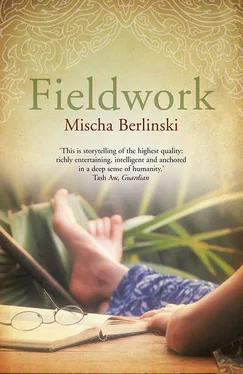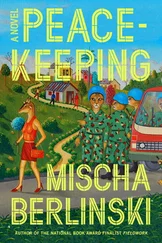Several years after his return to Chiang Mai, Gilles fell into conversation with a young Thai botanist at the university. Knowing nothing of his connection to Martiya, the younger man mentioned the story of the anthropologist who had murdered a missionary in the hills. Gilles knew at once that he was referring to Martiya. Gilles would have visited Martiya in prison, but he couldn't find her. He tried the same tactics that I had: lawyers, judicial records, old friends, even Karen Leon. My visit to his bambouserie had been the first piece of news he had had of Martiya in years.
PART FIVE. THE PENDULUM-EDGE OF THE SOUL
IN A SMALL CEREMONYat the end of May, Rachel's class — with the exception of Nat — was graduated from the first grade. To underscore the festive mood of the moment, Miss Rachel ordered pizza from Pizza Hut, a food better than which none of the students could imagine. As Miss Rachel's consort, I had been invited to attend the celebration, and Rachel and I listened attentively as the kids told us about their summer plans: Morris was going back to America for the summer, where he would stay with his grandparents, then would be returning to Thailand in the fall. He imagined his summer, it was plain to see, as an endlessly glistening string of ice-cream cones. "My grandmom, she let me eat so much!" Morris said, eyeing the last slice of pizza in the cardboard tray. Najda, her father, and his two wives would all be spending the summer in Chiang Mai, where the family would await the birth of not one but two younger siblings. Maria's father, who worked for the DEA, was being transferred to Bogotá. Within a year, she'd be speaking perfect Spanish, just as she now spoke perfect Thai. Nat would be repeating the first grade, but the prospect of another year of the same-old, same-old hardly seemed to faze the boy. He ran around the classroom blithely, chewing, for some reason only Nat knew, on his sandals. Summer vacation! When you're six years old, the summer is an abyss of time, and not one of Miss Rachel's students really imagined that the fall would ever come.
Miss Rachel, however, had seen the fall coming all too clearly, and she had made it plain that her time as a first-grade teacher in Thailand, exciting as the adventure had been, was over. She wanted to go back to the States, and go back to school: her experience in the first grade had made her dream of cool, sleek offices populated with bald-headed, suited adults. We had had any number of serious conversations about the future, then we had fights and arguments and tears. The end of anything is always painful. At some point, we both knew that Rachel would be going home without me.
Up until the moment that Rachel left, we maintained the fiction that she was going home before me, not without me, that I was just staying in Thailand to arrange a few loose ends. But at the airport, Rachel said, "I'll see you soon, won't I?" and began to cry.
"Of course ," I lied.
I spent the rainy season alone in our concrete house. It rained all day, every day. I fell into irregular hours, waking up at noon, falling asleep at dawn. I stopped going to yoga. I saw no one but people whom I had contacted on the off chance that they knew what Martiya had done. I wrote a series of listless, dull reviews — of films I can no longer recall, of restaurants whose food I described in a string of glossy clichés. I don't think I even bothered to visit the restaurants. I wrote a profile of the general manager of the Westin Hotel. It was work. I went back to my concrete house, and once, twice, three times picked up the phone to call Rachel and tell her I would be on the next flight to the States. But every time, some stray detail of the story brought me back, something I read in the notes I took when I met with Tim Blair, or an odd phrase from the loose-leaf binder of Martiya's letters.
The last six weeks of the school year had seen the story drift idly. Gilles Blouzon returned, as he did every year, to France, promising to be in touch. He wasn't. I called a dozen prominent figures at Chiang Mai University, trying to pursue the rumors that Gilles had heard; I found nothing. Martiya's village, Dan Loi? Try finding that hamlet on the map, or try finding someone who knows where it is: the Dyalo villages of northern Thailand are unincorporated entities — they splinter and fragment; villages spring up out of nowhere; others disappear. A number of trekking agencies offered to take me by elephant back through a dozen different hill-tribe villages in a dozen days, but not one could guarantee me that they knew where Martiya's village could be found.
I tried to convince myself that the thing was done. This was not only Rachel's advice, but Josh O'Connor's also: he had been shocked to hear I was still pursuing it. Josh's gelateria had been a huge success, and so had the Herbalife products. He bought himself a candy-apple-red Cadillac, hired a driver, and now tooled around Bangkok conducting business from his backseat by cell phone. He could hardly remember Martiya van der Leun. Even my mother told me to let it go. "It's important to have a balanced life," she said. She had been hearing me talk about Martiya the better part of a year.
In early September, I ran into Judith Walker and Tom Riley in the city center. We went for a cold drink at the same diner where Tom and I used to meet for breakfast. Judith and Tom were getting married, and if there exists a pair of human faces more excited and contented, I've never seen them. I gave them my congratulations. After a few minutes, Tom's cell phone squealed, and he got up to take the call outside. When he came back, he explained something complicated to Judith involving Bill and the jeep. The upshot was that he had to go. Judith's face fell, and as much to console her as for the pleasure of her company, I invited her to have another Coke with me.
"Well, okay," she said doubtfully.
But Judith and I ended up talking for a few hours. She played with her shoulder-length hair while she talked. "Do you like it?" she asked. "I'm going to grow it out for the wedding. Tom says he likes it short, but he's never seen me with long hair." Then she told me about her wedding gown, which would be ivory; her bridesmaids' dresses, which would be teal; and that she and Tom planned on going to the Holy Land for their honeymoon.
I asked Judith how old she was, and she told me that she would be nineteen on September twenty-third.
"So you never got to know your uncle David."
"No, not really. I was just six when he went Home. I remember a few things. I remember he was really tall, and had long hair, and he could do all sorts of animal impersonations. He could do an elephant and a horse and a monkey. When he had to baby-sit me or the other kids, he'd put us all in a circle and we'd make a zoo."
I had never really understood why Judith was living with her grandparents, and I asked her about it.
"It was just a little after Uncle David was called Home that my mom and dad decided they wanted to spend more time in the field," she said. "They've been living in Laos since then, near the Vietnam border. They're medical missionaries. I spent a couple of years with them there, but we decided that when it was time for high school, I'd live here with Grandma and Grandpa."
"That must have been tough, being away from your family and living with your grandparents," I said.
"You have no idea!" Judith laughed. "I love Grandma and Grandpa to death, but they're old and they're strict. Tom is the first boy they ever let me even be alone with. I didn't go to one party in high school."
"Who's the tougher one?" I asked. "Your Grandma or your Grandpa?"
"Oh, Grandpa, definitely. If it was up to Grandpa, I'd just stay home all the time. I'd probably never even have gone to school. Grandma sometimes says, ‘You've got to let that girl breathe.' But I understand, they're just worried, you know? Because of David." Judith's voice grew low, and she looked around the room. "Don't tell anyone, but sometimes in high school I snuck out the window at night."
Читать дальше












